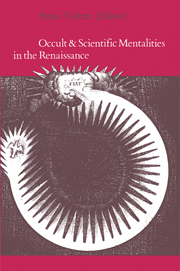Book contents
- Frontmatter
- Contents
- List of contributors
- Editor's preface
- Introduction
- 1 At the crossroads of magic and science: John Dee's Archemastrie
- 2 The occult tradition in the English universities of the Renaissance: a reassessment
- 3 Analogy versus identity: the rejection of occult symbolism, 1580–1680
- 4 Marin Mersenne: Renaissance naturalism and Renaissance magic
- 5 Nature, art, and psyche: Jung, Pauli, and the Kepler–Fludd polemic
- 6 The interpretation of natural signs: Cardano's De subtilitate versus Scaliger's Exercitationes
- 7 Kepler's attitude toward astrology and mysticism
- 8 Kepler's rejection of numerology
- 9 Francis Bacon's biological ideas: a new manuscript source
- 10 Newton and alchemy
- 11 Witchcraft and popular mentality in Lorraine, 1580–1630
- 12 The scientific status of demonology
- 13 “Reason,” “right reason,” and “revelation” in midseventeenth-century England
- Index
2 - The occult tradition in the English universities of the Renaissance: a reassessment
Published online by Cambridge University Press: 12 January 2010
- Frontmatter
- Contents
- List of contributors
- Editor's preface
- Introduction
- 1 At the crossroads of magic and science: John Dee's Archemastrie
- 2 The occult tradition in the English universities of the Renaissance: a reassessment
- 3 Analogy versus identity: the rejection of occult symbolism, 1580–1680
- 4 Marin Mersenne: Renaissance naturalism and Renaissance magic
- 5 Nature, art, and psyche: Jung, Pauli, and the Kepler–Fludd polemic
- 6 The interpretation of natural signs: Cardano's De subtilitate versus Scaliger's Exercitationes
- 7 Kepler's attitude toward astrology and mysticism
- 8 Kepler's rejection of numerology
- 9 Francis Bacon's biological ideas: a new manuscript source
- 10 Newton and alchemy
- 11 Witchcraft and popular mentality in Lorraine, 1580–1630
- 12 The scientific status of demonology
- 13 “Reason,” “right reason,” and “revelation” in midseventeenth-century England
- Index
Summary
Whether for better or for worse, it is no longer possible for historians interested in the “scientific revolution” to regard the movement solely in terms of the victory of true and rational scientific ideas over the scholastic and magical modes of thought circulating in the sixteenth and seventeenth centuries. Not only have the attitudes of various men of science toward scholasticism and Aristotelianism been scrutinized, but the extent to which these men created a solely rational construction of reality has also been questioned. Scholars such as Cassirer, Garin, Kristeller, and Yates have redirected our attention to the importance of the “occult tradition” in generating and disseminating the new scientific modes of thought. Their claim is that Neoplatonism, hermeticism, astrology, alchemy, and the cabala – individually or as a unified ideology – had as great an influence on Kepler, Galileo, or Newton as they did on Ficino, Agrippa, and Bruno.
To be sure, not all historians of science share this perspective. Even those who accept the importance of the occult tradition vary in the degree of their commitment. Paolo Rossi, one of the earliest proponents of the occult tradition, has recently voiced certain reservations:
What started off as a useful corrective to the conception of the history of science as a triumphant progress, is becoming a retrospective form of historiography, interested only in the elements of continuity [between the hermetic tradition and modern science] and the influence of traditional ideas.
- Type
- Chapter
- Information
- Occult Scientific Mentalities , pp. 73 - 94Publisher: Cambridge University PressPrint publication year: 1984
- 7
- Cited by



